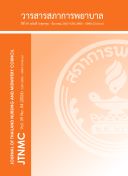Factors Predicting Health-Promoting Behaviors in Delaying Health Deterioration among the Community-Dwelling Older People in Samut Prakan Province
DOI:
https://doi.org/10.60099/jtnmc.v39i04.270015Keywords:
health-promoting behaviors, delaying health deterioration , older peopleAbstract
Introduction Older people experience normal changes in the aging process that lead to health deterioration. Although this health deterioration is unavoidable, it can be prevented and delayed through health-promoting behaviors. Examining factors predicting health-promoting behaviors in delaying health deterioration is therefore important to plan for the proper care of older adults.
Objective To investigate factors predicting health-promoting behaviors that delay the health deterioration in older people
Design This study employed correlational predictive design.
Methodology The participants comprised 148 older people aged 60 to 74 years residing in Samut Prakan province. Systematic random sampling was used. The sample size was determined according to power analysis. The research instruments included questionnaires on factors affecting health-promoting behaviors, and health-promoting behavior in delaying health deterioration. The reliability was tested, obtaining Cronbach alpha coefficients of .86 and .84, respectively. The data were collected from October-December 2023 using self-administration and structured interviews. Data were then analyzed using descriptive statistics and stepwise multiple regression analysis.
Results The majority of participants were female (63.51%), with an average age of 66.63 years (SD = 4.74, Min-Max = 60-74). Most of them had a health problem (75.00%) and a caregiver (73.65%). Factors predicting health-promoting behaviors in delaying health deterioration included perceived self-efficacy (β = .392, p < .01) and situation influences (β = .332, p < .01) that could together predict a 39.00% variance of health-promoting behaviors in delaying health deterioration. Perceived self-efficacy could explain the participants’ highest variance of health promotion behaviors.
Recommendation Nurses and the healthcare team should promote perceived self-efficacy and situational influences, increasing health-promoting behaviors and delaying health deterioration among older adults.
Downloads
References
Department of Older Persons .General information for the elderly. https://www.dop.go.th/th/know/2023.1 (in Thai)
Touhy TA, Jett KF. Ebersole & Hess› toward healthy aging: human needs & nursing response (10th ed.). Elsevier. 2020.
Fillit H, Rockwood K, Young J. Brocklehurst›s textbook of geriatric medicine and gerontology (8th ed.). Elsevier. 2017.
Meiners SE, & Yeager JJ Gerontologic nursing (6th ed.). Mosby Elsevier. 2019.
Mauk KL. Gerontological nursing: competencies for care (5th ed.). Bartlett Learning. 2023.
Ministry of Public Health. Population standard report group, population pyramid classified by gender, age group: Nong Prue subdistrict, Bang Phli district, Samut Prakan province. https://hdcservice.moph.go.th/hdc/reports/report.php?&cat_id=ac4eed1bddb23d6130746d62d2538fd0&id=db4e8d42e1234a75bd03d430c31feb2f.2023. (in Thai)
Murdaugh CL, Parsons MA, & Pender NJ. Health promotion in nursing practice (8th ed.). Pearson. 2019.
Department of Health .Guidelines for training caregivers for the elderly, 024 hour course. Office of the War Veterans Organization Printing. 2023.(in Thai)
Eliopoulos C. Gerontological nursing (10th ed.). Wolters Kluwer. 2022.
Dahlkemper TR. Anderson’s caring for older adults holistically (6th ed.). F.A. Davis, 2016.
Kanchanatawan B, Jitapunkul S, Supapitiporn S, Chansirikarnjana S. Validity of Clock Drawing Test (CDT), scoring by Chula Clock-Drawing Scoring System (CCSS) in screening dementia among Thai elderly in community. Journal of Medical Association of Thailand. 2006;89(8),1150-56.
Worapongsathorn T, Worapongsathorn S. Calculation of sample size for research using the G * Power software package. Thailand Journal of Health Promotion and Environmental Health, 2018;41(2), 11-21. (in Thai)
Bunthan W, Nuntaboot K, Sritanyarat W .Leadership development of older persons in community health promotion .Ramathibodi Nursing, 2018;,)2(42 591-871. (in Thai)
Phonphotthanamat W. A comparative study of verifying the content validity of a research instrument with the IOC, CVR and CVI. RSU Library Journal. 2022; 28(1),169-192.
Chen HH, Hsieh PL. Applying the Pender’s Health Promotion Model to identify the factors related to older adults’ participation in community-based health promotion activities. International Journal of Environmental Research and Public Health, 2021; 18(19), 9985. https://doi.org/10.3390/ijerph18199985 PMID: 34639294
Phromjuang K, Saeio K, Chanto S. Factors predicting on health-promoting behaviors among elders with hypertension disease. Thai Journal of Cardio-Thoracic Nursing, 2021;32(2), 233-246. (in Thai)
Downloads
Published
How to Cite
Issue
Section
License
Copyright (c) 2024 The Journal of Thailand Nursing and Midwifery Council

This work is licensed under a Creative Commons Attribution-NonCommercial-NoDerivatives 4.0 International License.








